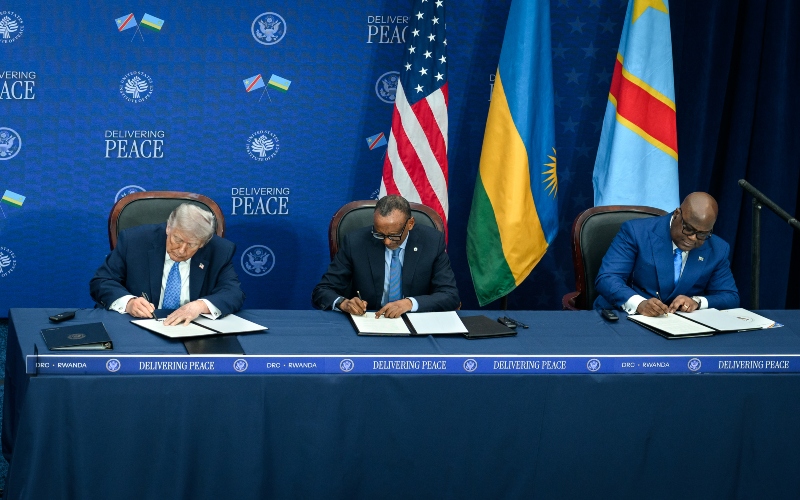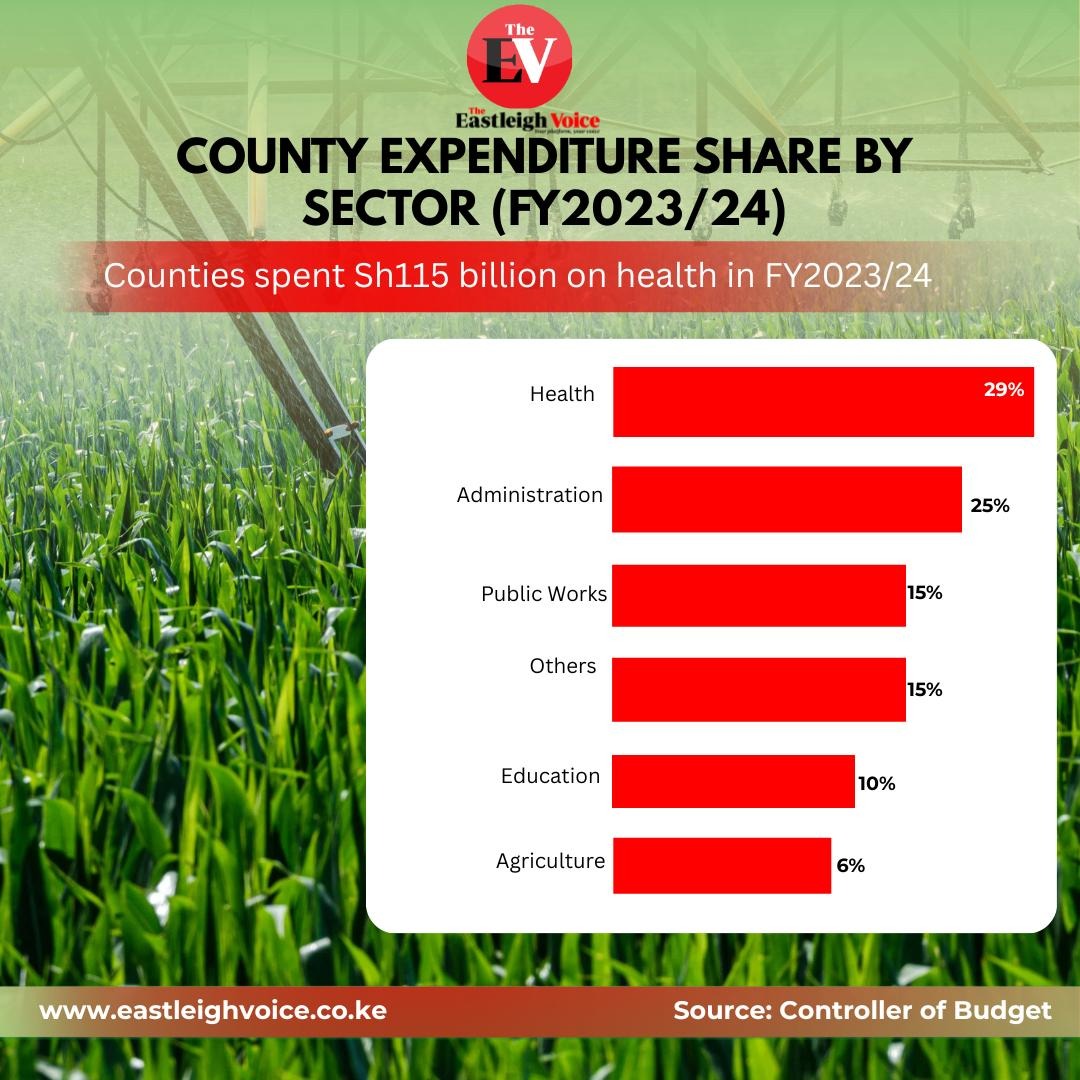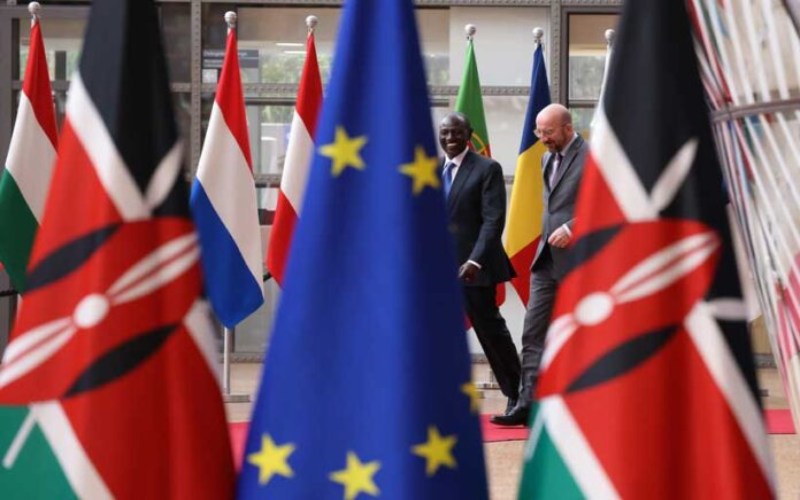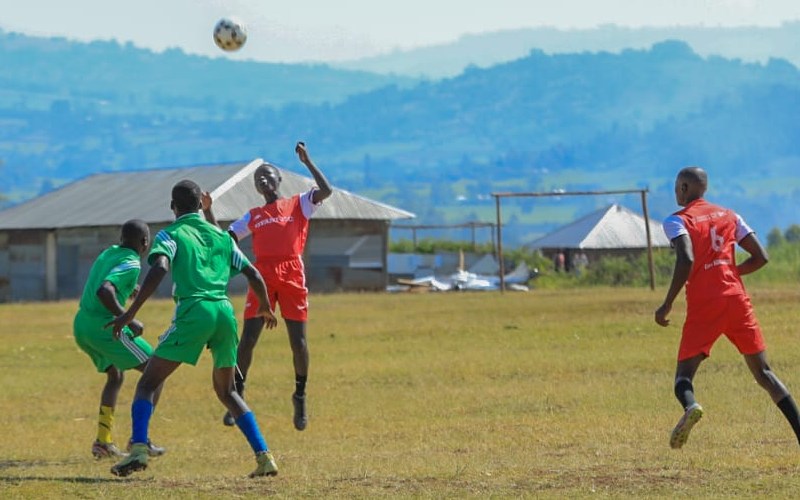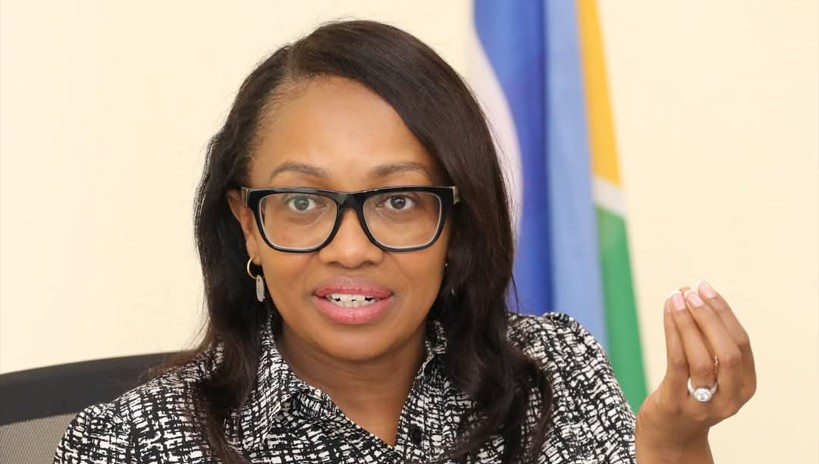Live blog: Treasury CS John Mbadi presents Sh4.2 trillion budget before Parliament
Mbadi described the 2025/2026 budget as responsive and focused on delivering tangible benefits to the Kenyan people while maintaining fiscal responsibility.
Welcome to our live blog as Treasury Cabinet Secretary John Mbadi is presenting the 2025/2026 budget before the joint houses of Parliament.
The National Treasury had released the 2025/26 Budget Policy Statement, raising total budget estimates to Sh4.26 trillion from Sh3.98 trillion in the previous fiscal year.
More To Read
- Parliamentary Budget Office warns Sh2.2 trillion projects at risk over funding delays
- Government’s increased revenue strategy faulted amid missed targets, public backlash
- No new levies in 2026 budget as Treasury focuses on improving revenue efficiency
- Mbadi gives counties 30 days to integrate payrolls with IPPD
- Judiciary calls for budget increase, says Sh20 billion deficit crippling functions
- Kenya’s current account deficit surges to Sh66 billion - KNBS
Currently, Treasury projects to raise Sh2.7 trillion in revenue and an additional Sh560 billion in government levies and service fees, totalling about Sh3.3 trillion. With Sh46.9 billion expected from grants, the budget faces a deficit of approximately Sh876 billion, to be covered through borrowing.
Mbadi described the 2025/2026 budget as responsive and focused on delivering tangible benefits to the Kenyan people while maintaining fiscal responsibility.
 National Treasury Cabinet Secretary John Mbadi outside Parliament Building on June 12, 2025. (Photo: Handout)
National Treasury Cabinet Secretary John Mbadi outside Parliament Building on June 12, 2025. (Photo: Handout)
The theme for this year’s budget is stimulating sustainable economic recovery for improved livelihoods, job creation and business and industrial prosperity in line with BETA.
Live: Updates
Sh10.7 billion for Forests, Resources, Conservation and Management
Sh1.6 billion for Forests Research and Development
Sh3.7 billion for Environment Management and Protection
Sh11.5 billion for the Kenya Financing Locally Led Climate Action Project
Sh1.6 billion for the Meteorological Service
Sh13.2 billion for wildlife security, conservation and management
Sh953 million for wildlife research and development
Sh1.1 billion for Human Wildlife Conflict compensation
Sh950 million for Wildlife Insurance
Sh26.8 billion for water and sewerage infrastructure development
Sh16.5 billion for water resources management
Sh1.9 billion for water storage and flood control.
Sh15.0 billion for irrigation and land reclamation
Sh266 million for water harvesting and storage for irrigation
Sh105.6 billion to empower the youth and support businesses owned by youth and women, and promote development in the constituencies
This allocation includes:
Sh10.0 billion for the National Youth Service
Sh3.6 billion to the National Youth Opportunity Towards Advancement (NYOTA)
Sh318 million for the Youth Enterprise Development Fund.
Sh990 million for Film Development Services
Sh353 million for the Women Enterprise Fund
Sh940 million for the provision of sanitary towels to school-going girls
Sh254 million for Strengthening Prevention & Response to Gender Based Violence in Kenya
Sh110 million for the eradication of Female Genital Mutilation
Sh4.0 billion for the National Government Affirmative Action Fund
Sh29.7 billion to support Sports, Culture and recreation as well as Tourism.
This proposed allocation includes:
Sh13.5 billion for the Sports, Arts and Social Development Fund
Sh2.3 billion to establish an Automation and Digitalisation System for the Sports Registrar
Sh241 million for the Anti-Doping Agency of Kenya
Sh402 million for Sports Kenya
Sh245 million for the Kenya Academy of Sports
Sh8.2 billion for the Tourism Fund
Sh4.8 billion for Tourism Promotion Fund
Sh41.4 billion in this budget to protect the vulnerable members of our society and promote affirmative action
This includes:
Sh25.1 billion to cater for cash transfers to elderly persons
Sh8.9 billion for cash transfers to Orphans and Vulnerable Children
Sh1.5 billion for cash transfers to persons living with severe disabilities
Sh202.3 billion for Defence
Sh125.7 billion for the National Police Service
Sh51.4 billion for the National Intelligence Service
Sh32.5 billion for Internal Security and National Administration
Sh38.1 billion for Prisons Services
Sh10.0 billion to cater for the leasing of police motor vehicles
Sh3.6 billion for Police Modernisation Programme
Sh1.2 billion for the construction and modernisation of National Forensic Facilities
Sh18.0 billion under various implementing Ministries, Departments and Agencies
Sh4.5 billion will support the establishment of County Integrated Agro-Industrial Parks
Sh2.8 billion for Supporting Access to Finance & Enterprise Recovery (SAFER) Project
Sh602 million for the development of Athi River Textile Hub
Sh705 million for the establishment of flagship Export Processing Zones Hubs
Sh504 million for the development of Special Economic Zone Textile Park Naivasha
Sh798 million for Kenya Jobs and Economic Transformation
Sh 702.7 billion to the Education sector
This includes:
Sh387.2 billion to the Teachers Service Commission (TSC). (Sh7.2 billion for the recruitment of intern teachers and Sh980 million for the capacity building of teachers on Competency-Based Education)
Sh7.0 billion for Free Primary Education
Sh28.9 billion for Junior Secondary School capitation
Sh993 million for Research, Science, Technology and Innovation
Sh41.5 billion to the Higher Education Loans Board for the provision of loans to University and TVET students
Sh16.9 billion for Scholarship for University Students
Sh7.7 billion Capitation and Scholarship for TVET students
Sh51.9 billion for Free Day Secondary education
Sh5.9 billion for administering the National Examinations
Sh3.0 billion for the School Feeding Programme
Sh7.2 billion for the recruitment of Intern Teachers
Sh4.0 billion for the Technical, Vocational Education Training & Entrepreneurship project
Sh1.7 billion for Primary and Secondary Schools’ infrastructure
Sh1.4 billion for the construction and equipping of the Technical Training Institutes and Vocational Training Centres.
Sh13.3 billion for the Kenya Primary Education Equity in Learning Programme
Sh2.3 billion for Kenya Secondary Education Quality Improvement Project
Sh62.8 billion to cater for key energy interventions. This includes:
Sh31.6 billion for the National Grid System
Sh16.3 billion for Rural Electrification
Sh11.5 billion for the development of geothermal energy
Sh2.1 billion for alternative energy technologies
Sh743.8 million for the development of nuclear energy
Sh217.3 billion for the development of roads.
This includes: Sh30.9 billion to support the construction of roads and bridges
Sh70.8 billion for the rehabilitation of roads
Sh115.6 billion for road maintenance
Sh38 billion to expand railway transport
Sh450 million for the Kenya Ferry Ramp in Mombasa
Sh331.2 million for the Nairobi Bus Rapid Transport Project
Sh298.7 million for the promotion of the E-Mobility Project
Sh110.4 million for the Acquisition of Ferries for Lake Victoria
Micro, Small and Medium Enterprise (MSME) Economy allocation
Sh300 million to the Financial Inclusion Fund, popularly known as the Hustler Fund
Sh308 million for the Youth Enterprise Development Fund
Sh550 million for the Centre for Entrepreneurship Project
Sh1.3 billion for Rural Kenya Financial Inclusion Facility
Sh12.7 billion to fund initiatives in the ICT sector.
This includes:
Sh3.1 billion for Konza Data Centre and Smart City facilities
Sh2.3 billion for the construction of the Kenya Advanced Institute of Science and Technology at Konza Technopolis
Sh3.7 billion for Kenya Digital Economy Acceleration Project
Sh333.2 million for government shared services
Sh382 million for the digital superhighway
Sh689 million for the establishment of digital hubs
Sh750 million for the maintenance and rehabilitation of the national optic fibre backbone infrastructure
Sh3.1 billion for Konza Data Centre and Smart City facilities
Sh138.1 billion has been allocated to the health sector to support various activities and programmes. They include:
Sh6.2 billion for UHC coordination and management
Sh13.1 billion for primary healthcare
Sh430 million for medical cover for the orphans, elderly and disabled persons in our society
Sh17.3 billion for HIV/AIDS, Tuberculosis and Malaria, and enhance the vaccines and immunisation programme (Global Fund).
Sh4.6 billion for vaccine and immunisation programmes
Sh8 billion for emergencies, chronic and critical illness fund to be managed SHA
Sh1 billion for the construction of a cancer centre at Kisii Level 5 Hospital
Sh100 million for strengthening cancer management at KNH
Sh100 million for the expansion of comprehensive cancer treatment at Kenyatta University Teaching Referral and Research Hospital
Sh42.4 billion for referral hospitals
Sh1.3 billion for the construction of the KNH bands and paediatric centre
Sh5.2 billion for KEMSA
Sh2.7 billion for KEMRI
Sh500 million for the procurement of family planning and reproductive health commodities
Sh300 million for the procurement of equipment at the National Blood Transfusion Services
Sh4.3 billion for medical interns
Sh3.2 billion for community health promoters
Sh303 million for the training of health personnel
Sh8.9 billion for KMTCs
The Housing, Urban Development and Public Works sub-sector has been allocated Sh128.3 billion.
This includes:
Sh13.4 billion for Kenya Urban Programme
Sh64.5 billion for the construction of affordable housing units
Sh10.5 billion for the construction of social housing units
Sh16.5 billion for social and physical infrastructure
Sh7.2 billion for Kenya Informal Settlement Improvement Project Phase II
Sh3.5 billion for the construction of housing units for the National Police and the Kenya Prisons
Sh2.6 billion for regulation and development of the construction industry
Sh500 million for building climate-resilience of the urban poor programme
Sh184 million for the construction of footbridges
Sh454 million for construction of county HQs
Sh3.8 billion for the settlement of the landless
Sh1.1 billion for processing and registration of title deeds
Sh712 million for the digitisation of land registries
Sh200 million for the geo-referencing of land parcels
Sh220 million for the construction of land registries
The Blue Economy has been allocated a total of Sh8.2 billion
Sh2.3 billion for the aquaculture business development project
Sh2.4 billion for the Kenya Marine Fisheries and Socio-Economic Development project
Sh500 million for Kabonyo Fisheries and Aquaculture Training Sector
Sh2.3 billion for derisking, inclusion and value enhancement of pastoral economies programmes
Sh1.6 billion for Kenya livestock commercialisation programme
Sh280 million for livestock value chain support project
Sh340 million for the development of the leather industrial park
Sh400 million for excess milk mop-up
Sh150 million for the modernisation of milk processing factories in Runyenjes and Narok
Sh10.2 billion for the national agricultural value chain development project
Sh8 billion for the fertiliser subsidy programme
Sh5.8 billion for the food systems resilience project
Sh1.2 billion for the food security and crop diversification project
Sh800 million for small-scale irrigation and value addition project
Sh2.0 billion for Coffee Cherry Revolving Fund
Sh2.0 billion for Coffee Debt Waivers
Sh1.5 billion for the sugar sector reforms
Sh120 million for the modernisation and revitalisation of cotton ginneries
Sh245 million for Horticultural Produce Compliance Enhancement Project
The resultant fiscal deficit, including grants, is projected at Sh923.2 billion, which is equivalent to 4.8 per cent of GDP.
This is down from the estimated Sh997.5 billion or 5.7 per cent of GDP in FY 2024/25.
The fiscal deficit for FY 2025/26 will be financed by net external borrowing of Sh287.7 billion and net domestic borrowing of Sh635.5 billion.
The Cabinet in January approved reforms to streamline state corporations and enhance governance and accountability of these corporations.
The approved reforms include:
The merger of 42 state corporations into 20 entities to improve operational efficiency and eliminate redundancy
Dissolution of 25 state corporations and their functions transferred back to their parent ministries or other state corporations
Restructuring six state corporations to align their mandates for improved performance
Declassification of four public funds currently categorised as state corporations and transferring their functions back to the relevant ministries
Declassification of 13 professional bodies currently categorised as state corporations to private entities with no exchequer budgets.
The government will implement the following initiatives to control the wage bill:
Fully implement the unified human resource management system across all public sector entities by July 2025.
The Salaries and Remuneration Commission (SRC) continues to sustainably reduce the number of allowances in public service through a phased approach aimed at streamlining allowances to improve transparency, accountability, equity and fairness.
To this end, the SRC will progressively review allowances and benefits in the future CBAs, aligning them to the allowances policy guidelines for the public service.
The National Assembly in December removed all taxes on retirement benefits.
The move is aimed at increasing disposable income among pensioners.
The next step is to digitise the identification of pensions to reduce the time it takes to process pension claims.
The government has invested significant resources and implemented radical changes in the education sector.
Among them is rolling out a new student-focused higher education model with special emphasis on students from vulnerable families.
In order to have a financing framework to manage disaster risks, the government is finalising the Public Finance Management (Disaster Risk Management Fund) Regulations 2025.
The regulations seek to establish a dedicated fund for addressing four cycles of preparedness, mitigation, response and recovery.
Inflation rates have declined to 3.8 per cent in May 2025 from a peak of 9.6 per cent in October 2022.
In response to the decline in inflation, CBK has gradually eased monetary policy, lowering the CBK bank rates from 13 per cent in August 2024 to 9.75 per cent in June 2025.
In order to create additional jobs for the youth, the government has begun rolling out Climate WorX and nationwide programme that will engage over 100,000 youth across all 47 counties.
In order to improve governance in the Public Procurement process, I launched the e-procurement system on April 7, 2025.
Beginning July 1, 2025, all procurement by MDAs will be done through e-procurement without any exception.
This will reduce the opaqueness and save government resources estimated at 10 per cent of procurable budgets.
The roll-out of the e-Procurement system is scheduled for July 2025.
Since February 2024, 6.5 million registered farmers have benefited from the fertiliser subsidy programme; as a result, the cost of fertiliser has reduced by 67 per cent, while maize production has increased by 38.9 per cent.
The government has facilitated the construction of affordable housing units across the country.
Since September 2022, 2,379 affordable housing units have been completed across four counties, with another 11,000 units in the last stages of completion.
The government is also supporting the development of institutional housing for the uniformed services and students.
We have reduced revenue projections to be in line with trends. Therefore, revenue projections in the FY 2025/2026 budget and over the medium term are consistent with the growth of the economy.
We adopted the zero-based budget where every budget item has to be justified at the beginning of every financial year.
Kenyans have expressed concerns about the public debt. In this regard, I requested the Auditor-General to conduct a comprehensive audit of public debt. This audit is currently ongoing, and once completed, the report will be shared with this House.
To enhance liquidity in the economy and support small businesses, we have started the process of settling pending bills that have been validated, particularly those related to road construction, which has resulted in the resumption of road construction across the country.
The pending bills verification committee will share their final report by the end of June 2025. This report will be analysed and recommendations tabled in Cabinet for approval, after which we shall embark on the process of clearing the eligible bills, starting with those related to individuals, businesses and MSMEs majority of whom have borne the brunt of non-payment.
The government has received 65,625 claims for pending bills valued at Sh571 billion. From this, 57 per cent, with a value of Sh522 billion, have been reviewed. From the review, claims estimated at Sh229 billion have been recommended for settlement.
We have strengthened public participation in all policy formulation, including the budget-making process.
As a result of consultations with the public, we have focused on easing the tax burden on Kenyans by increasing the pool of taxpayers and enhancing tax compliance.
In this year's budget-making process, we accorded Kenyans an opportunity to share their views on how to address the economic challenges facing our country.
Kenyans have been very resolute in voicing their concerns that include over-taxation and high cost of living, unemployment, the need for protection of the poor and vulnerable and the need to reduce government expenditure and wastage across the national and county governments.
Our Kenyan economy has remained resilient and registered an average growth of 5.2 per cent for the period between 2023 and 2024, outpacing both global growth of 3.3 per cent and 3.8 per cent for the Sub-Saharan region over the same period.
In 2024, the economy grew by 4.7 per cent, supported by positive growth in all sectors except construction and mining.
This growth was lower compared to 5.7 per cent in 2023, mainly due to the adverse effects of floods in the second quarter and the anti-finance bill protests in the third quarter of 2024 that disrupted economic activities
Top Stories Today
